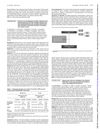 February 2024 in “bioRxiv (Cold Spring Harbor Laboratory)”
February 2024 in “bioRxiv (Cold Spring Harbor Laboratory)” Tandem repeats significantly influence hair color, especially darker shades, across different ancestries.
 February 2024 in “International journal of health, medicine and nursing practice”
February 2024 in “International journal of health, medicine and nursing practice” Raising awareness about PCOS can improve women's quality of life.
 January 2024 in “Deleted Journal”
January 2024 in “Deleted Journal” Essential oils may help hair health but lack strong scientific proof and can cause allergic reactions.
 January 2024 in “International journal of yogic, human movement and sports sciences”
January 2024 in “International journal of yogic, human movement and sports sciences” Yoga Nidra improves well-being and reduces anxiety in women with PCOS.
 December 2023 in “Health economics and management review”
December 2023 in “Health economics and management review” Radiographers in private hospitals face many health issues due to heavy workloads and long hours.
 December 2023 in “Journal of the Korean Society of Cosmetology”
December 2023 in “Journal of the Korean Society of Cosmetology” People interested in aesthetics, personality, and social life care more about their appearance and beauty routines.
 November 2023 in “International journal of biology, pharmacy and allied sciences”
November 2023 in “International journal of biology, pharmacy and allied sciences” Herbal treatments can help with hair problems, but more research is needed.
 November 2023 in “Deleted Journal”
November 2023 in “Deleted Journal” Multimedia education greatly improves women's knowledge and management of PCOS.
 November 2023 in “Martor”
November 2023 in “Martor” People still turn to witchcraft for help with modern problems despite technological advances.
 November 2023 in “Scholars academic journal of biosciences”
November 2023 in “Scholars academic journal of biosciences” Trichotillomania can cause severe complications like hairballs in the stomach, needing surgery and psychiatric care.
 October 2023 in “Han'gug miyong haghoeji/Journal of the Korean society of cosmetology”
October 2023 in “Han'gug miyong haghoeji/Journal of the Korean society of cosmetology” Understanding psychological discomfort in hair loss can improve treatment outcomes.
 September 2023 in “Journal of movement disorders”
September 2023 in “Journal of movement disorders” Dopaminergic therapy in Parkinson's disease patients is linked to increased hair loss.
 September 2023 in “Fides et Ratio”
September 2023 in “Fides et Ratio” The safety and effectiveness of gender-affirming treatments for children are uncertain, with potential long-term risks like infertility.

Lupus patients on TikTok feel isolated, face medical gaslighting, and prefer non-drug treatments.
 June 2023 in “International journal of biology, pharmacy and allied sciences”
June 2023 in “International journal of biology, pharmacy and allied sciences” New medications are improving depression treatment, emphasizing accurate diagnosis and chronic care.

Female rats showed more panic-related behavior than males, influenced by hormonal cycles and certain drugs.
 June 2023 in “Trichology and cosmetology:”
June 2023 in “Trichology and cosmetology:” Ageratum Conyzoides, when taken orally, can effectively reduce hair loss and improve hair growth.
 June 2023 in “Buletin de psihiatrie integrativă”
June 2023 in “Buletin de psihiatrie integrativă” Alopecia causes significant emotional distress and psychological issues, requiring combined skin and mental health treatment.

The document concludes that the girl's hairlessness is likely inherited from her parents.

A new system for classifying curly hair types using precise measurements can improve hair care products and cultural inclusion.
 December 2021 in “Trichology and cosmetology:”
December 2021 in “Trichology and cosmetology:” Taking Kera-Diet® improves hair and nail health without side effects.
 September 2021 in “Physiology News”
September 2021 in “Physiology News” Addressing underrepresentation in Parkinson's research is crucial for better treatments and understanding.
 September 2021 in “Physiology News”
September 2021 in “Physiology News” Air Vice-Marshal Sir Ralph Jackson significantly advanced dialysis technology in the UK.
 June 2021 in “Psychiatria Danubina”
June 2021 in “Psychiatria Danubina” The antidepressant escitalopram likely caused hair loss in a patient.
 January 2021 in “bioRxiv (Cold Spring Harbor Laboratory)”
January 2021 in “bioRxiv (Cold Spring Harbor Laboratory)” Mothers have more hair proteins than their children, with age-related differences in protein patterns, and some proteins in hair could indicate early childhood development.
 June 2020 in “Annals of the Rheumatic Diseases”
June 2020 in “Annals of the Rheumatic Diseases” Patients need better information about the risks of long-term steroid use.
 January 2020 in “Der Pharmacia Lettre”
January 2020 in “Der Pharmacia Lettre” Nanoparticle-based herbal remedies could be promising for treating hair loss with fewer side effects and lower cost, but more research is needed.
 December 2019 in “bioRxiv (Cold Spring Harbor Laboratory)”
December 2019 in “bioRxiv (Cold Spring Harbor Laboratory)” Redheaded people have higher levels of a vitamin D precursor, suggesting red hair may be an adaptation for better vitamin D synthesis in areas with less sunlight.
 April 2019 in “Journal of Investigative Dermatology”
April 2019 in “Journal of Investigative Dermatology” Many patients with autoimmune blistering skin disorders change their diets, avoiding foods like alcohol, citrus, and spices, and some find vegetables and dairy helpful.
 April 2019 in “Journal of Investigative Dermatology”
April 2019 in “Journal of Investigative Dermatology” Sandalore®, a synthetic scent, improved hair loss and satisfaction in women with telogen effluvium.






























